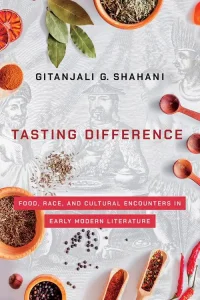Presented By: Medieval and Early Modern Studies (MEMS)
Winter 2023 MEMS Lecture. Blood, Fat, and Fear in Seventeenth-Century Travelogues
Gitanjali Shahani, San Francisco State University

Why do travelers, past and present, dwell on scenes of disgusting food preparation and consumption? Modern audiences might be familiar with the genre of culinary adventure shows, in which intrepid celebrity hosts travel to remote parts of the globe as food ethnographers, sampling everything from tarantulas in Cambodia to horse rectum sausages in Kazakhstan. Their early modern counterparts, while lesser-known, tell us equally grisly tales of food preparation that variously involve dripping fat, bloody entrails, and dung-smeared meats.
Indeed, the performance of disgust in encounters with foreign culinary and commensal rituals is a generic convention of the early modern travelogue. Travelers to different parts of the globe make sure to pause at a certain juncture in their narrative to record their affective response to the food of the other. Disgust, it would seem, lends immediacy and credibility to their tales of encounter. These narratives, especially when placed in conversation with domestic scenes of food preparation, depicted in household manuals and recipe books of the period, provide us an opportunity to analyze what we might call ‘gut responses’ to the idea of racial and cultural difference.
Gitanjali Shahani is Associate Dean and Professor of English at San Francisco State University, specializing in Shakespeare studies, postcolonial studies, and food studies. She is the author of Tasting Difference: Food, Race, and Cultural Encounters in Early Modern Literature (Cornell University Press, 2020). She has edited two collections, Food and Literature (Cambridge University Press, 2019) and Emissaries in Early Modern Literature & Culture (Routledge 2016, Ashgate 2009). Her articles on race and colonialism in early modern literature have been published in numerous collections and journals, including Shakespeare, Shakespeare Studies, and The Journal of Early Modern Cultural Studies.
Indeed, the performance of disgust in encounters with foreign culinary and commensal rituals is a generic convention of the early modern travelogue. Travelers to different parts of the globe make sure to pause at a certain juncture in their narrative to record their affective response to the food of the other. Disgust, it would seem, lends immediacy and credibility to their tales of encounter. These narratives, especially when placed in conversation with domestic scenes of food preparation, depicted in household manuals and recipe books of the period, provide us an opportunity to analyze what we might call ‘gut responses’ to the idea of racial and cultural difference.
Gitanjali Shahani is Associate Dean and Professor of English at San Francisco State University, specializing in Shakespeare studies, postcolonial studies, and food studies. She is the author of Tasting Difference: Food, Race, and Cultural Encounters in Early Modern Literature (Cornell University Press, 2020). She has edited two collections, Food and Literature (Cambridge University Press, 2019) and Emissaries in Early Modern Literature & Culture (Routledge 2016, Ashgate 2009). Her articles on race and colonialism in early modern literature have been published in numerous collections and journals, including Shakespeare, Shakespeare Studies, and The Journal of Early Modern Cultural Studies.